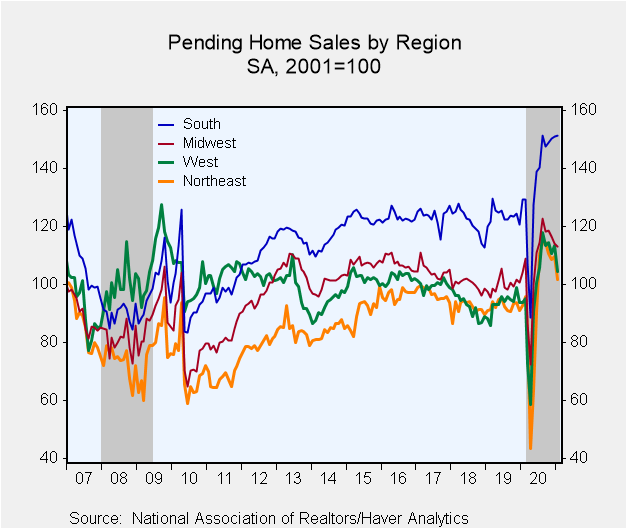 Global| Feb 25 2021
Global| Feb 25 2021Inventory Constraints Impede U.S. Pending Home Sales in January
Summary
• Sales remain mixed across regions. Pending home sales fell 2.8% (+13% y/y) in January, following an upwardly revised increase of 0.5% (+20.8% y/y) in December. According to the National Association of Realtors (NAR) the weakness in [...]
• Sales remain mixed across regions.
Pending home sales fell 2.8% (+13% y/y) in January, following an upwardly revised increase of 0.5% (+20.8% y/y) in December. According to the National Association of Realtors (NAR) the weakness in January reflected inventory constraints, which dissuaded prospective buyers. The weakest regions were the Northeast and the West, where pending home sales fell 7.4% (+9.6% y/y) and 7.8% (+11.5% y/y). The Midwest posted a small monthly decline of 0.9% (+8.6% y/y) and the South outpaced all regions with a small increase of 0.1% (+17.1% y/y).
The pending home sales index measures sales at the time the contract for the purchase of an existing home is signed, analogous to the Census Bureau's new home sales data. In contrast, the National Association of Realtors' existing home sales data are recorded when the sale is closed. In developing the pending home sales index, the NAR found that the level of monthly sales contract activity leads the level of closed existing home sales by about two months. The series dates back to 2001, and the data are available in Haver's PREALTOR database. Mortgage interest rates from the Mortgage Bankers Association can be found in the SURVEYW database.| Pending Home Sales (SA, % chg) | Jan | Dec | Nov | Jan Y/Y % | 2020 | 2019 | 2018 |
|---|---|---|---|---|---|---|---|
| Total | -2.8 | 0.5 | -0.9 | 13.0 | 6.9 | 1.0 | -4.1 |
| Northeast | -7.4 | 1.0 | -1.8 | 9.6 | 2.5 | 0.7 | -5.2 |
| Midwest | -0.9 | -2.1 | -1.6 | 8.6 | 7.7 | -0.3 | -4.6 |
| South | 0.1 | 0.6 | 0.9 | 17.1 | 8.5 | 1.8 | -1.8 |
| West | -7.8 | 2.5 | -3.5 | 11.5 | 5.9 | 1.1 | -7.3 |
Kathleen Stephansen, CBE
AuthorMore in Author Profile »Kathleen Stephansen is a Senior Economist for Haver Analytics and an Independent Trustee for the EQAT/VIP/1290 Trust Funds, encompassing the US mutual funds sponsored by the Equitable Life Insurance Company. She is a former Chief Economist of Huawei Technologies USA, Senior Economic Advisor to the Boston Consulting Group, Chief Economist of the American International Group (AIG) and AIG Asset Management’s Senior Strategist and Global Head of Sovereign Research. Prior to joining AIG in 2010, Kathleen held various positions as Chief Economist or Head of Global Research at Aladdin Capital Holdings, Credit Suisse and Donaldson, Lufkin and Jenrette Securities Corporation.
Kathleen serves on the boards of the Global Interdependence Center (GIC), as Vice-Chair of the GIC College of Central Bankers, is the Treasurer for Economists for Peace and Security (EPS) and is a former board member of the National Association of Business Economics (NABE). She is a member of Chatham House and the Economic Club of New York. She holds an undergraduate degree in economics from the Universite Catholique de Louvain and graduate degrees in economics from the University of New Hampshire (MA) and the London School of Economics (PhD abd).
More Economy in Brief
 Global| Feb 05 2026
Global| Feb 05 2026Charts of the Week: Balanced Policy, Resilient Data and AI Narratives
by:Andrew Cates








